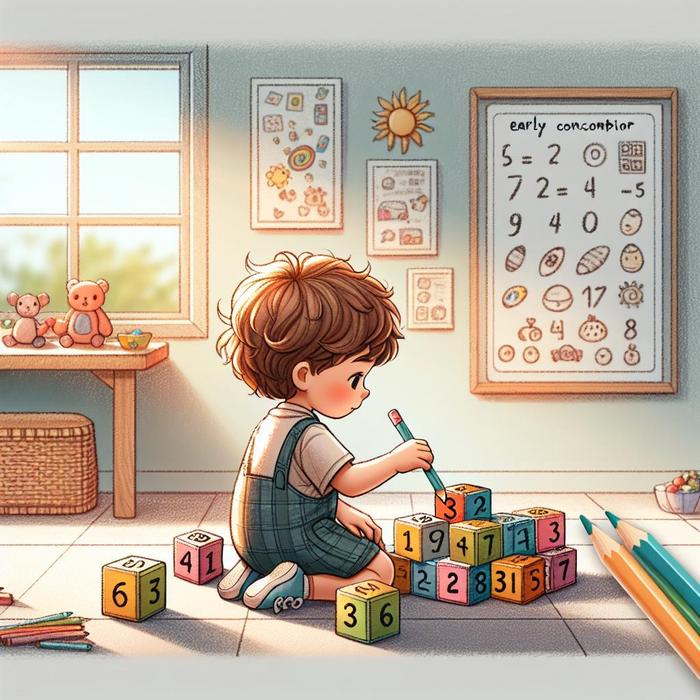Developing Early Math Skills in Children: A Journey of Fun and Learning
Introducing kids to the joys of learning from an early age sets a strong foundation for their lifelong educational experiences. One particular field that can be remarkably rewarding, yet largely overlooked, is early math. Presenting educational games and activities in a fun, spirited way can make a significant difference in children’s approach to math.
Why Early Math Concepts Matter
The focus on early math concepts is more than simple number crunching. We’re talking about deep, conceptual understanding that provides children with a complete toolkit for number recognition, logical reasoning, problem-solving, and pattern recognition:
- Number Recognition: This is the first step towards understanding numbers, where children learn to identify and name different numbers.
- Logical Reasoning: Logical reasoning is the ability to think critically and solve problems. Early exposure to mathematical logic enhances this essential skill.
- Problem-Solving: Mathematics is intrinsically connected with problem-solving. Introducing early math concepts fosters a child’s ability to think creatively and solve problems.
- Pattern Recognition: Recognizing and predicting patterns lays the groundwork for more complex math concepts such as algebra and geometry.
Fun Activities for Introducing Numbers
Integrating math into everyday activities can be a smooth and enjoyable process. Here are some creative, fun-filled ways to introduce numbers and counting activities to your little ones.
Counting Candy Hearts
Surprisingly, candies can be excellent learning tools! The sweetness of candy hearts can introduce children to the concept of counting and numbers in a fun, interactive way. Check out this engaging activity that combines learning with a sweet treat.
Singing Songs With Numbers
Music is a universal language that kids adore. There are various children’s songs that introduce numbers and counting in playful, tuneful ways. Songs like “Five Little Monkeys” or “One, Two, Buckle My Shoe” can be a wonderful way to introduce early math concepts. Research shows that music can help develop math skills by improving memory and attention.
Playing with Blocks
Blocks are a childhood staple, offering endless possibilities for creativity and learning. Building towers, sorting by shape and color, counting blocks, or arranging them in patterns can introduce basic math concepts in an engaging, hands-on way.
Using Everyday Objects
Utilize everyday objects present in your home environment to make learning more relevant and fun. For instance, ask your child to count the number of spoons, apples, or chairs in your home. This helps children connect numbers with actual objects, making learning more concrete.
Lastly, remember that patience and positive reinforcement go a long way in making learning a fun-filled journey for your child. Happy counting!
Beyond Number Recognition: Diving Into Early Math Concepts
Early math education reaches far beyond simple numerical identification. It delves into abstract mathematical concepts crucial for young minds. Each of these fosters unique abilities contributing to the overall cognitive development of children:
- Sorting and Categorization: This fundamental mathematical concept helps children recognize similarities and differences, arrange objects based on specific attributes, and classify them. Simple daily activities, such as sorting laundry or categorizing their toys, can introduce children to this important concept.
- Measurement: Early introduction to measurement helps kids understand the size, length or weight of objects. Activities such as measuring ingredients while baking or estimating the height of objects can easily present this concept in an engaging manner.
- Shapes and Structures: Recognizing shapes and structures is a key part of early math learning. Integrating shape-based activities, such as shape puzzles or integrating shapes into storytelling, can make learning shapes a creative and fun process.
- Spatial Awareness: Developing spatial awareness, such as understanding directions or recognizing positional words (over, under, far, near), is an essential part of early mathematics. It leads to a better grasp of more intricate geometric concepts later on.
Engaging Tools to Enhance Early Math Skills
A variety of intuitive and stimulating tools can make learning arithmetic fascinating and appealing. Here are some effective educational resources you can use:
Multimedia Rhythms and Rhymes
Incorporating digital media tools into a child’s learning process often enhances engagement. You can find a plethora of interactive rhymes and songs on Children’s Songs Youtube Playlist designed to aid in children’s mathematical development. These lively songs introduce kids to numbers whilst keeping them thoroughly entertained.
Online Platforms Providing Math Activities
Various online resources offer easy-to-understand, playful activities to assist children on their journey of numeric discovery. Websites like Zero to Three provide innovative games and activities that can considerably boost your kid’s curiosity about math.
Creating a Supportive Learning Atmosphere
Keep the learning environment fruitful. Encourage mathematical thinking and inquiry in everyday situations. Validate your child’s efforts to solve problems independently. Offer gentle guidance when they find challenges, ensuring that instead of answers, you help them discover strategies to find solutions. Your continuous encouragement and praise will fuel their interest and confidence in learning math.
In the fascinating journey of developing early math skills in children, remember: the goal isn’t just to teach, it’s to inspire a love for learning that lasts a lifetime. Enjoy the voyage of discovery, of numbers, patterns and more, with your little one. Reflect in their growth, dedication and smile, and keep the joy in the journey alive.





